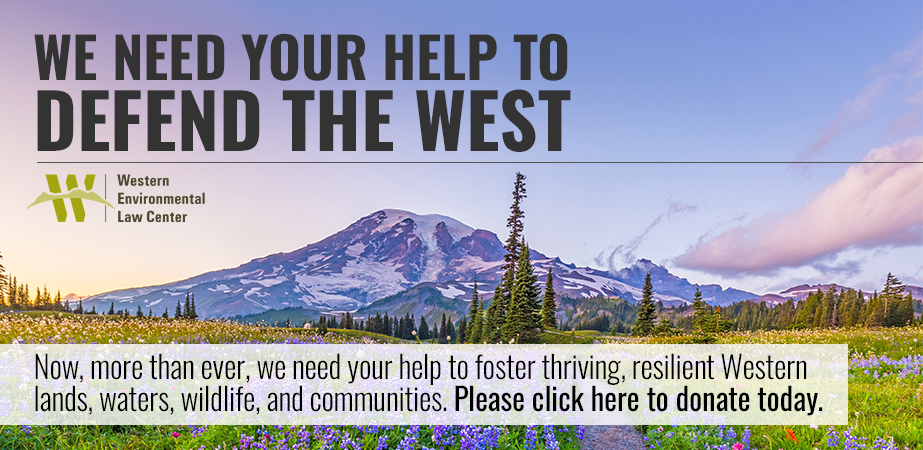Today, the Bureau of Land Management (the Bureau) issued a proposed rule that focuses almost exclusively on long-overdue fiscal reforms to the federal oil and gas leasing program, with a slight nod to protecting wildlife habitat and cultural sites.
The proposed rule makes no attempt to address the outsized contributions of the U.S. oil and gas leasing program to the climate crisis. The word climate appears in the 322-page document only once, superficially. Indeed, the sole nod to climate is the Bureau’s request for comment on whether the use of “preference criteria” should be expanded to include analysis of greenhouse gas emissions “and related decision-making based on the analysis.” By characterizing the use of “preference criteria” as a way to direct oil and gas leasing to “appropriate locations,” however, the Bureau is all but ensuring that any such analysis will not include a discussion of managed decline or phase-out of leasing, which the IPCC and other major scientific bodies have recognized as a minimum requirement for constraining warming below critical thresholds.
The Bureau telegraphed its modest intentions for the proposed rule in its November 2021 “Report on the Federal Oil and Gas Program,” which we noted at the time failed to live up to its billing as a “comprehensive review” responding to the climate crisis. The report ignored climate in favor of a call for decades-overdue fiscal reforms. The Bureau’s failure, once again, to seize an opportunity to address the worsening climate crisis is nonetheless deeply troubling.
“Following months of consecutive climate disasters, the Bureau of Land Management’s determination to rearrange deck chairs instead of deploying lifeboats is deeply disturbing,” said Melissa Hornbein, senior attorney with the Western Environmental Law Center. “Coming from an administration that kicked off its tenure with some of the loftiest climate rhetoric of any government on the global stage, Interior’s obdurate reaffirmation of the status quo is staggering.”
Rather than reducing lease terms to three years to quell speculation–a problem identified by the Bureau itself–the proposed rule would simply increase “rental fees” by a few dollars per acre the longer oil and gas companies hold leases undeveloped. In 2022, Big Oil took in a record $219 billion in profit, doubling its “earnings” over the previous year. These rental fees will not change the industry’s behavior, nor are increases in royalty payments likely to do so.
The same sentiment applies to the proposed rule’s increased bonding fees. While it is appropriate to raise bonding rates over the $10,000 set in 1960, the new proposed rates are still inadequate. Not only must the nation ensure future wells are plugged, we must also plug the EPA-estimated millions of abandoned wells that exist today. This has already thrust the oil and gas industry’s expenses on to the public to the tune of $4.7 billion in the Bipartisan Infrastructure Law alone. Further, inadequate bonding has caused the abandoned well crisis, exposing the public to groundwater pollution and contributing nearly 3% of total U.S. methane emissions. That number is probably higher due to incomplete data. Methane is a greenhouse gas 86 times more potent than carbon dioxide over the short term.
The proposed rule’s provisions for protecting wildlife habitat and sensitive cultural sites read as an afterthought to siting new permits near existing infrastructure and equipment. The proposed rule’s language leaves a tremendous amount of leeway for subjective decision making over whether cultural sites or wildlife habitat will be protected at all, and if so, which. Moreover, while the proposed rule acknowledges the Bureau’s authority under the Federal Land Policy and Management Act (FLPMA) to prevent “unnecessary or undue degradation,” the proposed rule also misses an important opportunity to implement a strategy to at least partially mitigate the climate and other impacts of the oil and gas leasing program. The Bureau must do more to fulfill this obligation under FLPMA.
Similarly, while the Bureau rightly acknowledges the potential for disproportionately high, adverse, and cumulative impacts of leasing and drilling on “underserved communities” and environmental justice––and its authority to require reasonable measures to avoid, minimize, or mitigate those impacts––the proposed rule doesn’t ensure such protections. The continued oil and gas extraction enabled by the rule is fundamentally incompatible with advancing environmental and climate justice.
The Bureau’s summary of the proposed rule is available here.
Contacts:
Melissa Hornbein, Western Environmental Law Center, 406-708-3058, gro.w1751514328alnre1751514328tsew@1751514328niebn1751514328roh1751514328
Ally Beasley, Western Environmental Law Center, 575-751-0351, gro.w1751514328alnre1751514328tsew@1751514328yelsa1751514328eb1751514328

